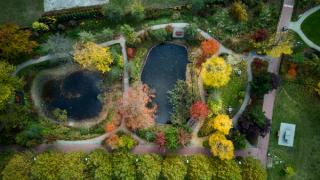
Leveraging ecologists in land development: What their expertise can bring to ESC and landscape architecture
- Post Date
- 27 November 2025
- Read Time
- 6 minutes

When we talk about land development, there are many components to consider; erosion, hydrology and landscape architecture among them. Every site-altering activity impacts soil, water flow, and topography, and these elements don’t exist in isolation – they interact with the ecological landscape around them.
In Ontario, plans like Erosion and Sediment Control (ESC) and landscape plans are typically prepared by qualified and certified professionals such as engineers (P.Eng.) and members of the Ontario Association of Landscape Architects (OALA). While these experts are essential, there is an opportunity to consider someone with an ecology-based background either as a Qualified Person (QP) for preparing these plans or as a primary partner in the conversation.
In this article, we’ll explore how ecologists can serve as valuable partners and even a QP in certain planning scenarios. We will look at ESC and Landscape Architecture to illustrate where these considerations can work best.
Erosion and Sediment Control
My first position as an ecologist was with the Bureau of Land Management (BLM) in Southern California, working in areas devastated by forest fires. These areas were left with bare exposed soil, making it vulnerable to erosion and sedimentation from wind, rain, and even recreational use as they began to recover. Assessments to support management plans were required to protect these areas, but an added challenge was that the burned areas were revegetating with both native and invasive species. Although vegetation is needed to prevent erosion, plans for native species to revegetate an area are important for long-term ecological health; this is an example of where an ecologist’s knowledge plays a pivotal role.
I have been an instructor for Canadian Certified of Sediment and Erosion Control (CAN-CISEC) program and contributed to the development of the Certified Designer of Sediment and Erosion Control (CDSEC) program. However, current practice requires a P.Eng. stamp for ESC plan approval, so it is unlikely that a plan prepared by myself – or any other ecologist without P.Eng., for that matter – would be accepted or approved. I have seen firsthand how well-positioned ecologists are to prepare ESC plans. With the right knowledge and experience, an ecologist could develop a plan that meets the same standards as a P.Eng. With boots on the ground across seasons and sites combined with an understanding of natural heritage features, ecologists can offer a unique insight to complement and strengthen the work of professional engineers tasked with completing ESC plans.
Ideally, plans should be developed collaboratively by a qualified ecologist and a P.Eng. The complexity of landscapes and the need to protect ecological functions make it important to have someone with a thorough understanding of ecology supporting the engineering process. It’s no different than ensuring the right inspectors are assessing on-site protection measures. After all, the primary goal of an ESC plan is to safeguard sensitive ecological features, so why wouldn’t ecologists be a part of the process?
In fact, in the United States, ESC plans are often prepared by professionals with CDSEC or similar experience and qualifications, not exclusively by engineers. In Canada, it would be great to see the construction industry embrace a similar approach and have more opportunities to understand the reasons behind ESC measures. For example, putting up a silt fence or installing outlet barriers is not just a regulatory checkbox; it’s about protecting natural heritage features during site-altering activities. Every detail serves a purpose, and bringing ecologists into the process can help realize this.
Landscape Architecture
Landscape plans in Ontario are typically required to be prepared and stamped by an OALA certified landscape architect. When site alterations have the potential to impact natural heritage features, it is essential to consider ecological needs alongside design. Restoration plans, for example, can go beyond aesthetics by considering enhancements that provide ecological benefits and offset anticipated impacts. It is common for ecologists to provide input to ensure plans meet the needs of the site and the adjacent lands – such as selecting native plants and habitat features suited to the site’s moisture regime, soil, and sun exposure. Without this expertise, important ecological details can sometimes be overlooked.
I recently participated in a university project that looked at landscape plans for Ontario species-at-risk, where the students were challenged to think beyond planting plans and hardscaping to design habitats that provided ecological benefits for their chosen species-at-risk – highlighting the interconnectedness of design and ecology. As a postgraduate of Niagara College’s Ecosystem Restoration certification program, I have had the opportunity to provide input to landscape architects and complete basic plans, as have several of my colleagues. While current practice in Ontario typically requires these plans to be prepared and stamped by landscape architects, the expertise ecologists bring demonstrates that we should be equally recognized as QPs and enabled to stamp these plans where appropriate – deserving consideration alongside OALA certification.
Considerations for the Industry
ESC and landscape/restoration plans rely on each other, highlighting the need for better consistency and collaboration across services. In Alberta and British Columbia, ecologists with ESC certifications or with P.Biol. or R.P.Bio. designations and appropriate experience can complete and sign off on ESC plans for temporary works and landscape restoration plans. Adopting a similar approach in Ontario would recognize the expertise ecologists bring and offer greater flexibility for the industry.
One of the many reasons I love ecology is its lesser-known connection with so many other fields of study. Ecology is closely related to earth and environmental sciences, microbiology, physics and chemistry, math, statistics, computer science and modeling, meteorology and climatology. At SLR, this breath of expertise allows ecologists to contribute to a wide range of services and support our clients in meaningful ways. To provide an even higher level of quality, it would be beneficial for Ontario to establish a professional organization that provides certification – like those in other provinces – that allows ecologists to design and sign off on ESC and landscape/restoration plans.
Regardless of how the industry evolves, my fellow ecologists and I will continue to support where our experience and expertise overlap. We’ll provide insight to those that require ecological input, work with Ontario approval authorities to help protect the natural environment, and, most importantly, share knowledge with colleagues and emerging ecologists whenever possible.
This Insight is part of our In Focus series. Learn more about the author below.
Ecology - Kim LoganRecent posts
-

-

Unlocking value through solar PV repowering: A focus on module replacement and DC/AC optimisation
by David Fernandez
View post -
